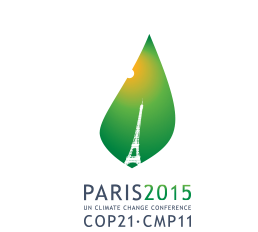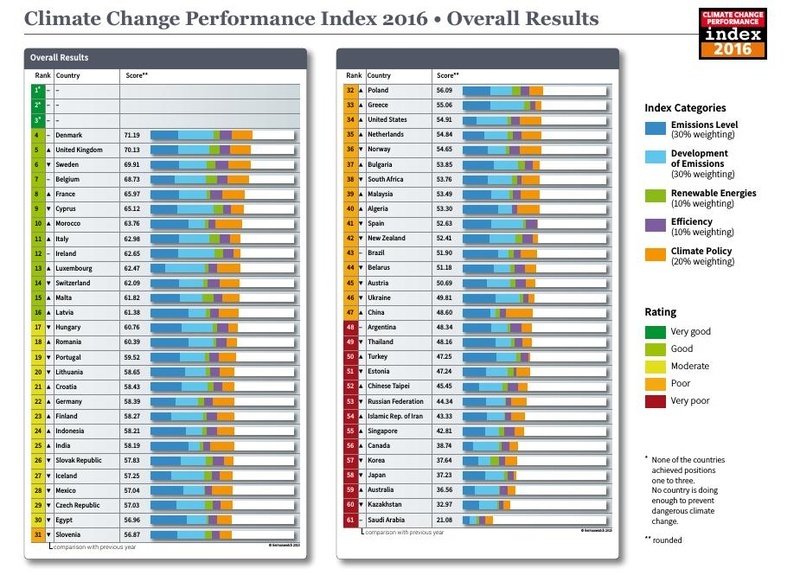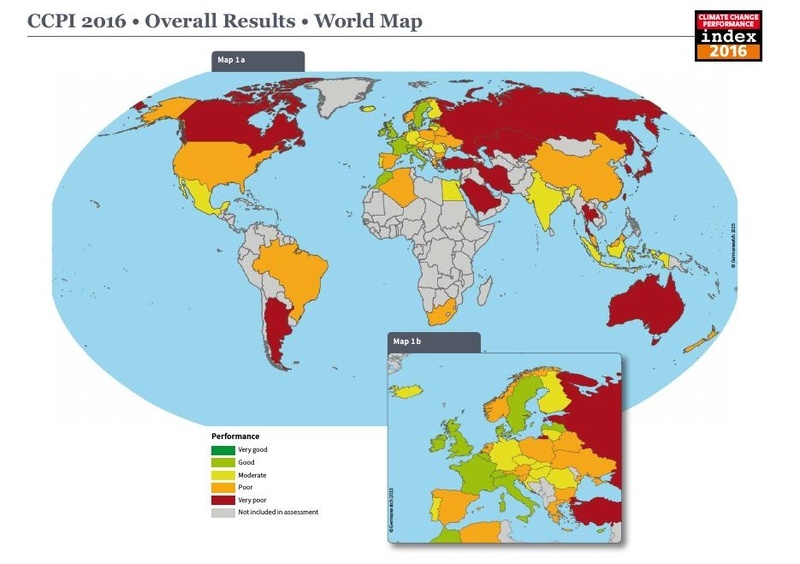News Release from windfair.net
Wind Industry Profile of
CCPI 2016: Wind of Change
There are some indicators in the report causing cautious optimism that, in fact, the world is facing a turnaround in global climate protection. It seems as if the world community had finally realized that urgent action is required. Similar signs are also showing meanwhile in Paris where some observers already speak of a looming sensation.
A final outcome of the negotiations is expected for tomorrow. Most important is how binding the targets will be for the future. Will all states of this planet agree to step up the efforts for climate protection in the future?
"We see global trends, indicating promising shifts in some of the most relevant sectors for climate protection and important steps towards a transformation of the energy system", says Jan Burck of Germanwatch and author of the CCPI. "The energy intensity of global economy is further declining. In the next years, it will be crucial to decarbonise the energy sector on a global scale. The years 2013 and 2014 saw for the first time a higher amount of newly installed capacity from renewables than from all other energy sources combined; indicating that many countries have already started decarbonising their energy sector.”
Taking a look at the Climate Change Performance Index 2016, however, the first three ranks remain free, as always in recent years, because according to the initiators of the study no country is doing enough to prevent climate change. 'Best of the Rest' is still Denmark on 4th rank. The Scandinavian country has lost a little ground though to the persecutors, because it is currently unclear whether the new Danish government will pursue the ambitious environmental protection plans of their predecessors.
On 5th rank this year the UK follows, which has exchanged places with Sweden. This success is owed primarily to the continuous expansion of renewable energy in the UK and the announcement of wanting to get out of coal as the first industrial nation ever. At the same time, David Cameron's government has placed a stop in subsidies for onshore wind power. So it remains to be seen how the country will further develop.
Germany still remains stuck in the midfield on rank 22 – nearly just like last year. Blame that on the still very high proportion of lignite in power generation, whose emissions are ruining Germany's success in the energy turnaround. However, Federal Environment Minister Barbara Hendricks has already indicated that the role of coal could change in the near future.
Despite the ranking, Germany cannot be accused of doing nothing to prevent climate change. Six months ago at the G7 summit in domestic Elmau, Chancellor Angela Merkel unceremoniously put the topic on the agenda and so forced the other industrialized nations to seriously deal with the issue. Result was a Memorandum of Understanding to promote industrial decarbonization by the year 2100 – an intention that is, surprisingly, still valid in Paris.
 And though Japan is currently trying to undermine liabilities in the formulations at the COP21, even the Japanese don't dare to turn away from the target completely. Meanwhile in the CCPI, there are still no positive reviews for the Asians, quite the contrary: They deteriorated and slipped to rank 58 (of 61) in almost every category.
And though Japan is currently trying to undermine liabilities in the formulations at the COP21, even the Japanese don't dare to turn away from the target completely. Meanwhile in the CCPI, there are still no positive reviews for the Asians, quite the contrary: They deteriorated and slipped to rank 58 (of 61) in almost every category.
Shortly before the release of CCPI in the past year, the United States and China had published their historic Memorandum of Understanding to reduce CO2 emissions. Both countries, which are among the largest CO2 emittends in the world, have been working to implement their promise since then. US President Barack Obama has released a comprehensive Climate Action Plan in summer, while various measures have already been underway. All that makes the US jump to rank 34 in the CCPI - an improvement of 12 places.
The Chinese currently have to suffer from the effects of a failed climate policy in recent years, where the country's energy demand was fed mainly with coal. Meanwhile the smog in Chinese cities is so violent that the government has imposed even closures of factories. But anyway recent data of 2014 and 2015 show at least a decoupling of energy demand from economic growth and suggest a decrease of coal consumption in 2015 by almost six per cent. It will take quite a while though until taken measures will fully hit.
Other countries are already one step further: Ahead of Paris, the great uncertainty was the question of how emerging markets would behave. So far, all ambitious plans were always vetoed by nations such as India and Brazil. While Brazil, compared to last year, took no big moves in the CCPI, Germany sent a group delegation to its trading partners, in order to convince the Brazilians to stop blocking any decisions in Paris. Apparently with success, as Spiegel Online reported (read in German), because for the first time ever, a major emerging economy announced recently that they want to get out of oil, gas and coal.
The positions of India and the oil states remain difficult though. Jan Burck comments on the negotiations: "For decarbonising the energy system on a global scale, it will be important that the world's emerging economies manage to decarbonise their energy sector before their economies are as dependent on coal as the ones from developed countries." India (25th in the index) and many African countries are about to make important decisions regarding their energy investments. Providing support for the right decisions could play a key role here.
Again, Germany attempted to give an impetus: Ten billion dollars will be provided by the industrial nations in the coming years for the development of renewable energy in Africa – three billion of that money is provided by Germany. And in case that coal country Poland should continue to produce itself as EU's obstructionist, Germany might again provide incentives on their neighbour and trading partner.
Well, anyway, there is still plenty left to do to get the 'Thumps up' in Paris!
- Author:
- Katrin Radtke
- Email:
- kr@windmesse.de



